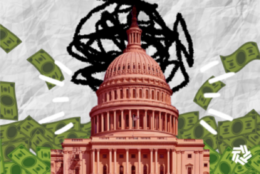Congress
-
The cash-strapped U.S. Postal Service says it can return to being profitable and begin to pay down its debt if Congress gives it the authority to overhaul its health benefits structure. Postmaster General Pat Donahoe told the Senate Homeland Security and Governmental Affairs Committee Thursday that launching a postal-specific health care plan would help save the agency $8 billion annually through 2016.
September 26, 2013 -
Sen. Claire McCaskill (D-Mo.) wants to know whether many of the federal government's Senior Executive Service members are deserving of the bonus payments they receive. McCaskill, who chairs a Senate subcommittee on financial and contracting oversight, wrote to the head of the Government Accountability Office, asking the watchdog agency to investigate whether bonuses paid to SES employees involved in contract management are effective tools in reducing costs or improving contract performance.
September 25, 2013 -
Partisan disagreements over President Barack Obama's health care overhaul have Congress lurching toward a deadline to fund federal agencies in the upcoming fiscal year -- or risk a government shutdown. So, what do you think? After all the political rhetoric and wrangling, is the government heading for a shutdown — this time for certain? Take our poll and let us know what you think the odds are.
September 25, 2013 -
OMB Director Sylvia Burwell received a letter from Sen. Tom Coburn earlier this month asking for the facts and figures on how agencies are spending acquisition funds in the fourth quarter.
September 24, 2013 -
Members of Congress are frustrated at what they see as a failure by the Department of Homeland Security to effectively manage the acquisition practices of its various components, leading to poorly defined requirements and wasted money. But DHS says some of the problems are of Congress' own making.
September 23, 2013 -
Suzanne Spaulding, the nominee to be the deputy undersecretary of the National Protection and Programs Directorate, told Senate lawmakers DHS had to reduce the number of federal devices that will be covered by the CDM program because of budget shortfalls.
September 20, 2013 -
Key senators on the Homeland Security and Governmental Affairs Committee are seeking answers into how the contractor employee responsible for the mass shooting at the Washington Navy Yard that killed 12 people obtained his security clearance. In a Sept. 18 letter, Sens. Claire McCaskill (D-Mo.) and Jon Tester (D-Mont.), requested the Office of Personnel Management's inspector general look into what type of clearance the shooter, identified as 34-year-old Aaron Alexis, held as well as what federal agency conducted his background investigation.
September 18, 2013 -
New legislation introduced by Sens. Tom Coburn (R-Okla.) and Joe Manchin (D-W.Va.) pushes the Pentagon toward being ready for a full financial audit by restricting spending on major weapons programs if DoD fails to get its books in order.
September 18, 2013 -
On this week's Capital Impact show, Bloomberg Government analysts will discuss the summer's employment numbers, and what Congress will be working on this month. September 12, 2013
September 12, 2013 -
House Democrats have crafted their own plan to temporarily fund federal agencies when the new fiscal year starts Oct. 1. Rep. Chris Van Hollen (D-Md.), the ranking Democrat on the House Budget Committee announced Thursday he plans to introduce a Democratic alternative to the GOP continuing resolution that would replace automatic budget constraints set to continue into fiscal 2014.
September 12, 2013 -
Greg Stanford, director of government affairs for the Federal Managers Association, and Federal Times Senior Writer Sean Reilly will discuss furloughs, layoffs, and other issues affecting federal workers. September 11, 2013
September 11, 2013 -
The House Appropriations Committee unveiled a stopgap spending measure late Tuesday that would fund agencies slightly below current budget levels through Dec. 15. The bill gives agencies some additional spending flexibilities and includes a measure that could help agencies stave off furloughs in the first few months of fiscal 2014.
September 11, 2013 -
There's been no shortage of legislation introduced this year affecting the federal workforce. Federal News Radio's Bill Tracker follows the bills that would affect federal pay and benefits, the size of the workforce and more.
September 09, 2013 -
Congress returns to work today with a crowded agenda and little time. Lawmakers must come to agreement on 2014 funding before the fiscal year ends Sept. 30 or risk a government shutdown. Also on the agenda: coming up with an alternative to the automatic spending constraints known as sequestration and negotiating a raise in the government's borrowing limit. There are also other measures affecting federal employees that remain to be worked out, including legislation to overhaul the cash-strapped Postal Service and a potential 1 percent pay raise for civilian federal workers.
September 06, 2013 -
Want to know the size of the next federal pay raise? Your best bet is to take $20, or the going rate, and find yourself a first-class tarot card reader. If she deals you the Ace of Pentacles you will be in the money, Senior Correspondent Mike Causey says.
September 05, 2013



